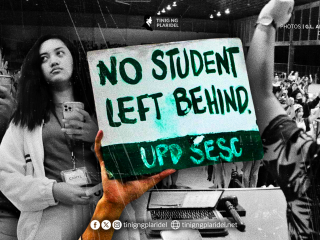Story by A.J.L.
Cellular network subscribers will have more time to register their subscriber identity modules (SIMs) after the government decided to extend the deadline until July 25.
The Department of Information and Communications Technology (DICT) announced the 90-day extension on April 25, a day before the originally scheduled deadline.
Among the reasons cited by the agency were a low registration turnout.
Since it started in late December, SIM registration had been sluggish, owing to glitchy registration methods and concerns about data privacy and security.
Data from the National Telecommunications Commission show that more than 77 million SIMs have yet to be registered as of April 25.
Republic Act 11934 or the SIM Registration Act, the first law enacted by President Ferdinand Marcos Jr., requires the registration of SIMs used for electronic devices to curb the increasing number of text scams and spams.
RELATED: All you need to know about the SIM Registration Act
SIMs that are unregistered after the deadline will be automatically deactivated. The subscriber can no longer use the SIM for mobile internet access, calling and messaging services, including receiving texts with temporary passwords for social media and online banking.
Subscribers will only be given five days after the deadline lapses to register and reactivate their SIMs, else it will be permanently deactivated.
Glitches in registration
For subscribers like third-year anthropology student Marielle Calicdan, having continuous access to their SIM and mobile number is important, since this acts as a gateway to other services like email, social media and online banking.
When she tried to register her SIM online, the website denied the pictures of her passport despite being listed among the accepted IDs as proof of identification.
“Isa lang ‘yung government ID ko, passport lang, kaso yung hinihingi nilang i-upload is front and back photo, so hindi ko alam ano i-u-upload ko doon sa file bin ng back photo,” Calicdan said.
She added that she had been putting off the registration until weeks before the deadline due to doubts about the safety of the information she would be sharing to her network provider and, by extension, the government.
“Natatakot [ako], lalo na since may history of data leaks yung Philippine government at notorious din sa human rights violations,” Calicdan said.
She was referring to the two hacking incidents involving the Commission on Elections in 2016 and 2022, where hackers obtained voters’ information and the agency’s website data.
Privacy woes
Mass organization officer Carlos* shared the same sentiment. He worries that the personal information attached to registered SIMs can be used by the state to spy on private individuals, especially critics.
“Syempre nakakatakot siya. Isang bahagi kasi siya ng profiling ng gobyerno. Pino-profile niya ‘yung mga mamamayan [para malaman] kung ano ba ‘yung mga ganap nila,” he said.
As an officer, Carlos uses his mobile number to communicate with local chapters across the country and as an added layer of security for his social media accounts.
Under the SIM Registration Act, telecommunication companies (telcos) can be required to disclose information about a SIM owner if they are involved in criminal activity.
The law also allows providers to store relevant information of subscribers for up to ten years after they have deactivated their mobile number.
Global privacy defenders group Privacy International warned against the repercussions of SIM registration policies, including state profiling and surveillance.
“SIM registration undermines the ability of users to communicate anonymously and one’s right to privacy. This poses a threat to vulnerable groups, and facilitates surveillance by making tracking and monitoring of users easier for law enforcement authorities,” Privacy International said.
The group added that the vagueness of the wording in SIM registration laws could also be used to build comprehensive profiles of users that may be used to “identify and target political opponents.”
Some telcos were also questioned for including optional tick boxes to grant them permission to process subscriber information for commercial and promotional purposes.
To address fears, the National Privacy Commission directed network providers to remove these options from the SIM registration portals and modify their websites to comply with the Data Privacy Act.
As of writing, telcos have removed said boxes in their registration portals.
Constitutionality questioned
On April 17, various privacy rights groups filed a petition at the Supreme Court (SC) seeking to declare RA 11934 as unconstitutional, citing violations in the right to privacy of communication and correspondence among others.
The petitioners requested for a temporary restraining order (TRO) against the law’s implementation. They also sought a cease and desist order against the “using, storing, transferring and processing” of information from the SIM registration process and the destruction of all data that had already been gathered.
Among the petitioners are leaders of the National Union of Journalists of the Philippines and Bagong Alyansang Makabayan as well asthe Junk SIM Registration Network, which earlier argued that the law will only make citizens more vulnerable to new forms of scams and selling of sensitive information.
“Ang online na registration process ay hindi lapat sa kalagayan ng milyon-milyong Pilipino na limitado ang akses sa internet,” the network wrote in another online petition.
On April 25, the SC denied the request for a TRO on the implementation of the SIM Registration Law. No reason has been given behind the denial.
Last push
In a press briefing on April 25, DICT secretary Ivan John Uy stressed that the extension to July 25 is the first and only grace period that the agency will be giving for SIM registration.
“[This] is the last chance. The law actually has our hands tied. We are only allowed to do this, the extension once and up to a certain period of time,” Uy said.
Telcos and the government are beefing up their registration efforts. Aside from their websites and mobile applications, they have also set up in-person “assisted registration sites” to accommodate subscribers in far-flung and underserved areas. They are also providing complimentary data allocations to subscribers after they have successfully registered their SIMs.
Smart also launched its “Mag-SIM Reg para hindi SIM Dead” campaign, warning users of the dangers of not being able to register such as forfeiting available load balances, being unable to receive one-time passwords for banking apps and losing access to social media sites.
Calicdan, a Smart subscriber, argued however that this approach may not be effective, since it limits the “autonomy” of the public to share their private information.
“When you’re implementing a national requirement and you’re trying to convince the public to do so, it’s only proper na you do it in a way that it passes as a full and informed consent on what it’s for, how its implementation benefits the citizens,” Calicdan said.
To encourage registration, the DICT also mentioned exploring the “phased” barring of certain cellular services such as data and calls for unregistered users during the 90-day extension.
In the end, both Calicdan and Carlos* admitted that they will eventually register their SIMs to avoid losing access not only to calls and texts but also to other services connected to their SIMs.
“Nandyan na siya ‘eh. Sobrang mali naman na hindi na ako magre-register. Nasa system na siya so kailangan kong mag-compromise,” Carlos* shared.
*Interviewee requested anonymity for security reasons.









